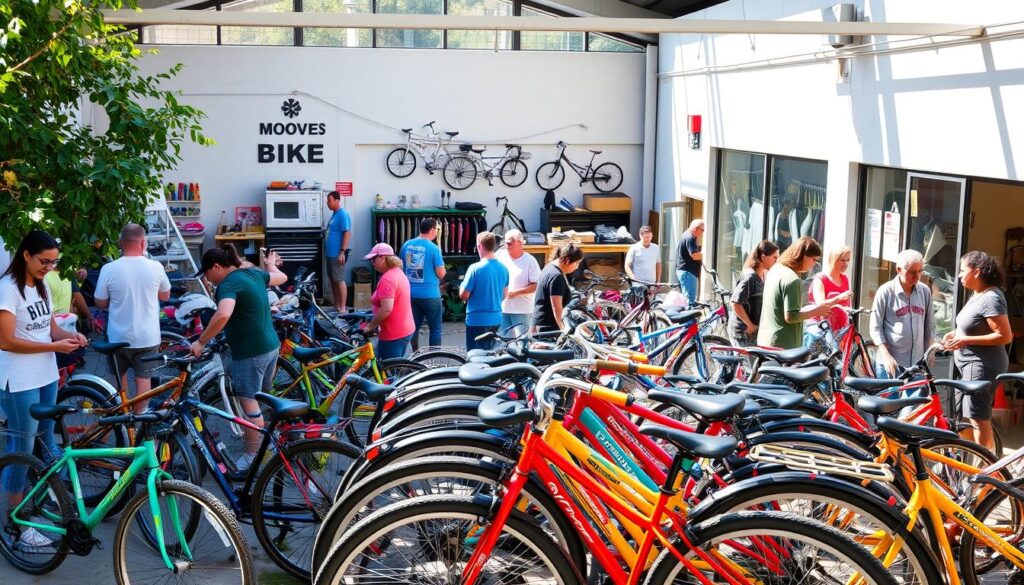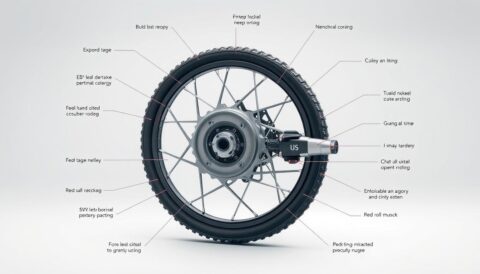Recycling bicycles is crucial for eco-friendly cyclists. Many bike shops now offer innovative disposal solutions. These efforts reduce waste and promote sustainable transport1.
Cyclists have several options for responsible bike disposal. Bike recycling methods are becoming more creative. Street Level Cycles refurbishes or recycles over 1,000 unwanted bicycles yearly2.
The used bike market is growing rapidly. This growth creates exciting opportunities for bicycle recycling1. Good Karma Bikes receives thousands of donated and impounded bicycles annually3.
They sell about 50% of these bikes. An even larger percentage is refurbished for donation3. This approach keeps bikes out of landfills and benefits the community1.
Bicycle recycling involves more than just metal parts. Bikes contain metals, rubber, and carbon fibre. Each material presents unique recycling challenges1.
Rubber can be recycled, but carbon fibre is trickier. Local programmes can divert significant waste from landfills. Some initiatives prevent up to 40,000 pounds of waste through reuse and recycling2.
This approach supports sustainable practices. It also provides affordable transport options for communities in need3. Bike recycling is a win-win for the environment and society.
Understanding Bicycle Recycling and Its Environmental Impact
Bicycle recycling is vital for sustainable transport and environmental conservation. It turns old bike parts into valuable resources. This process cuts waste and shrinks ecological footprints through clever recycling methods.
Why Bicycle Recycling Matters
Bike recycling does more than reduce waste. Sustainable transportation relies on proper material management. Cyclists and makers now see the importance of eco-friendly practices4.
Bicycles produce zero emissions during use. This makes them an excellent eco-friendly transport option4.
Components That Can Be Recycled
Almost every bike part can be recycled. Key recyclable bike parts include:
- Steel frames (100% recyclable into building components)5
- Aluminum components (repurposed into airplane parts)5
- Rubber tyres (transformed into playground surfaces)5
- Plastic components (converted into park benches)5
Environmental Benefits of Bike Recycling
Bicycle recycling has a big impact on the environment. Good recycling programmes can greatly cut carbon emissions and landfill waste6.
About 60% of buyers now want sustainable bicycle products6. This shows growing care for the environment.
Recycling a single bicycle can prevent multiple materials from ending up in landfills, contributing to a more sustainable future.
| Material | Recycling Potential | New Product Applications |
|---|---|---|
| Steel | 100% | Building components, food cans |
| Aluminum | High | Airplane parts, beverage cans |
| Rubber | Significant | Playground surfaces, new tyres |
Bike recycling turns waste into opportunity. It supports both environmental sustainability and circular economy principles.
Can you recycle a bike: A Complete Guide to Disposal Options
Bike disposal offers several eco-friendly options. Cyclists can choose from various methods to responsibly get rid of their old bicycles. These choices help reduce waste and support sustainability7.
- Donate to charitable organisations8
- Sell through online platforms7
- Recycle at specialised centres7
- Upcycle bicycle components7
Many charities collect bicycles for refurbishment and community support. Bicycles for Humanity, for example, has sent numerous bikes to communities in need8.
Responsible bike disposal contributes to environmental sustainability and social welfare.
| Disposal Method | Benefits |
|---|---|
| Charitable Donation | Supports community transportation needs |
| Online Selling | Potential financial return |
| Recycling Centre | Environmentally responsible disposal |
Professional recycling centres process bicycle materials efficiently. Most bikes contain recyclable metals, allowing up to 100% material recovery8.
Upcycling bike parts is another innovative approach to minimising waste7. This method gives old bike components a new purpose.
Consider your bicycle’s condition before disposal. Functional bikes might find new life through donation. Damaged bikes can be dismantled for parts or recycled responsibly7.
Local Bike Shops and Recycling Programmes
Bicycle recycling is vital for eco-friendly cyclists in the UK. Local bike shops support sustainable cycling through innovative recycling programmes. These initiatives help protect our environment and promote responsible cycling practices.
The used bike market is booming. Many shops now offer bike recycling services. Cyclists can responsibly dispose of old bicycles while supporting their local communities.
Finding Participating Bike Shops
When searching for local bicycle recycling options, consider these strategies:
- Contact local bicycle retailers directly
- Check community cycling organisations
- Explore municipal waste management websites
- Visit online cycling forums for recommendations
What Bike Shops Typically Accept
| Condition | Acceptance Likelihood |
|---|---|
| Fully functional bikes | High |
| Bikes needing minor repairs | Medium |
| Bikes with significant damage | Low |
Preparing Your Bike for Recycling
To prepare a bike for recycling, follow these essential steps:
- Clean the bicycle thoroughly
- Remove personal accessories
- Disassemble components if required
- Gather all original parts
Bike tyre rubber can be recycled for various purposes1. Some charities accept these materials for creative projects. This shows the potential for repurposing bicycle components.
“Recycling your bicycle isn’t just about disposal—it’s about creating opportunities for others and protecting our environment.”
Carbon fibre bikes need special recycling processes1. Always check with your local bike shop about their recycling capabilities. This ensures proper disposal of your bicycle.
Non-Profit Organisations and Charitable Donations
Donating an old bike can change lives and support sustainable community projects. Bicycle charities in the UK offer amazing ways to reuse unwanted bicycles. These efforts create a positive social impact9.

Several bike donation centres run unique programmes that help local communities. Some groups have given thousands of bicycles to people in need9.
Since 1994, dedicated teams have worked hard to find new homes for bicycles9.
“Every donated bicycle represents hope and mobility for someone in our community”
Key Benefits of Bike Donations
- Provide transportation for underserved communities
- Support environmental sustainability
- Create learning opportunities for youth
- Generate tax-deductible donation receipts
Many bike donation centres work with impressive efficiency. Some groups rely entirely on volunteers. This ensures all donations directly support their mission10.
Youth programmes gain greatly from these donations. They offer skill-building chances for young people aged 12-1810.
| Organisation Type | Key Features |
|---|---|
| Community Bike Centres | Repair workshops, skill training, low-cost bicycle access |
| Charitable Bike Programmes | Redistributing bicycles to individuals in need |
| Educational Initiatives | Youth bicycle building and mechanics programmes |
Donating your old bike to these brilliant organisations does more than clear space. It creates opportunities and supports sustainable community growth11.
Professional Bicycle Removal Services
Professional bike removal services offer a convenient solution for cyclists with unwanted two-wheelers. These services provide an excellent alternative for those struggling to transport or recycle their bikes. They make disposing of old bicycles hassle-free and efficient.
Collection Process
Professional bicycle disposal services streamline the entire removal experience. The process typically involves scheduling an appointment and receiving a quote. Professionals then collect the bike directly from your location at a convenient time.
- Scheduling an appointment online or by phone
- Receiving a preliminary quote for the bike removal service
- Arranging a convenient pickup time
- Having professionals collect the bike directly from your location
Many services will contact you 15-30 minutes before arrival, ensuring a smooth collection process12. They specialise in removing various bike types, including mountain, racing, and indoor cycling bikes12.
Cost Considerations
The cost of professional bicycle disposal can vary. Some services offer competitive pricing, with average removal costs starting around £10512. Many providers guarantee upfront pricing, which can be 20-30% less expensive than traditional removal methods12.
Service Coverage Areas
Most professional bike removal services operate across major urban and suburban regions. They focus on eco-friendly disposal practices, aiming to recycle as much of the bicycle as possible12.
Nearly every bicycle component can be recycled, including frames made from aluminium, titanium, and carbon fibre13.
Professional bike removal services transform the challenging task of bicycle disposal into a simple, environmentally responsible solution.
These services offer an efficient and responsible approach to saying goodbye to unused bicycles. They provide a convenient old bike collection method for cyclists seeking a simple solution.
Conclusion
Responsible bike disposal goes beyond simply discarding an old bicycle. It’s about embracing sustainable cycling practices that benefit our environment and communities14. Your bike’s journey can continue through innovative recycling and donation programmes15.
Bicycle recycling offers various responsible options. Local bike shops can refurbish used bikes for those in need15. Repair initiatives help reduce resource consumption and waste14.
By recycling or donating, cyclists contribute to a circular economy. This approach emphasises reuse and regeneration, making a positive impact14.
Sustainable cycling is a community effort. Bike kitchens collect abandoned bicycles, while non-profits support global cycling programmes1415. Every action counts towards creating a more sustainable future.
Proper recycling reduces landfill waste and supports local bicycle ridership15. The potential impact of these efforts is significant and far-reaching.
Ready to make a difference? Explore local recycling options and support community bike programmes. Make your bicycle’s end-of-life as meaningful as its first ride.
Your choice can create positive environmental change. It can also support cycling communities across the United Kingdom. Take the next step in your cycling journey today.
FAQ
Can I recycle my old bicycle?
Yes, you can recycle your old bicycle through various methods. Local bike shops, recycling programmes, and charitable donations are all options. Many bicycle components can be recycled or repurposed, reducing environmental waste.
What bike parts are recyclable?
Most bicycles contain recyclable materials including aluminium frames, steel components, and rubber tyres. Bike shops and recycling centres can process these materials. They separate them for appropriate recycling or repurposing.
How do I prepare my bicycle for recycling?
To prepare your bicycle for recycling, clean it thoroughly and remove personal accessories. If possible, disassemble major components. Check with local bike shops about their specific preparation requirements.
Are there charities that accept bicycle donations?
Many UK charities accept bicycle donations, including Bikes for Africa and Re-Cycle. Local community cycling initiatives also welcome donations. These donations provide transportation for those in need.
What are the environmental benefits of bicycle recycling?
Bicycle recycling reduces landfill waste and conserves raw materials. It minimises energy consumption in manufacturing and lowers the carbon footprint. It’s an excellent way to support environmental sustainability.
How can I find local bike recycling programmes?
Search online for local bike shops or contact your municipal waste management centre. Reach out to cycling organisations in your area. Many local councils offer recycling programmes for old bicycles.
What if my bicycle is in poor condition?
Even bicycles in poor condition can often be recycled. Professional removal services can process bikes with significant wear. They extract valuable materials and ensure responsible disposal.
Are there costs associated with bicycle recycling?
Costs vary depending on the service. Some bike shops offer free recycling. Professional removal services might charge a small fee. Charitable donations are typically free and may include collection.
Can I get money for my old bicycle?
Some bike shops offer trade-in or buyback programmes for bicycles in good condition. You could also sell your bike second-hand. Recycling valuable components can provide some financial return.
What happens to bicycles after they are recycled?
Recycled bicycles are typically dismantled. Metal components are melted down for reuse. Rubber tyres are repurposed, and plastic parts are processed into new materials. Some bikes are refurbished and donated to community programmes.
Source Links
- Follow These Simple Rules When You Want to Recycle Your Bike
- Street Level Cycles
- San Jose Nonprofit Bike Shop – Good Karma Bikes
- Unveiling the Bicycle Life Cycle: Environmental Impact – Bike New Zealand
- A Look at Bicycle Recycling Materials
- The Future Of Sustainable Bicycle Manufacturing – CompLam
- How to Dispose of Old Bikes: Ultimate Guide 🚲 – EZ CleanUp
- How to recycle a bicycle
- Recycle Bicycles | A Non Profit Corporation
- Bicycle Kitchen Los Angeles – A nonprofit bicycle repair educational organization
- Donations – Bikerowave Coop
- Exercise Bike Removal and Disposal Services | LoadUp
- Bicycles
- 9 Ways Repairing Bikes Contributes To A More Sustainable Future
- What is Recycling and What Can I Do As a Cyclist? – Cycle for Recycle








